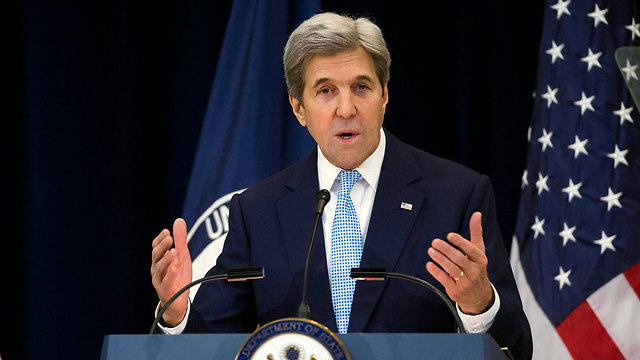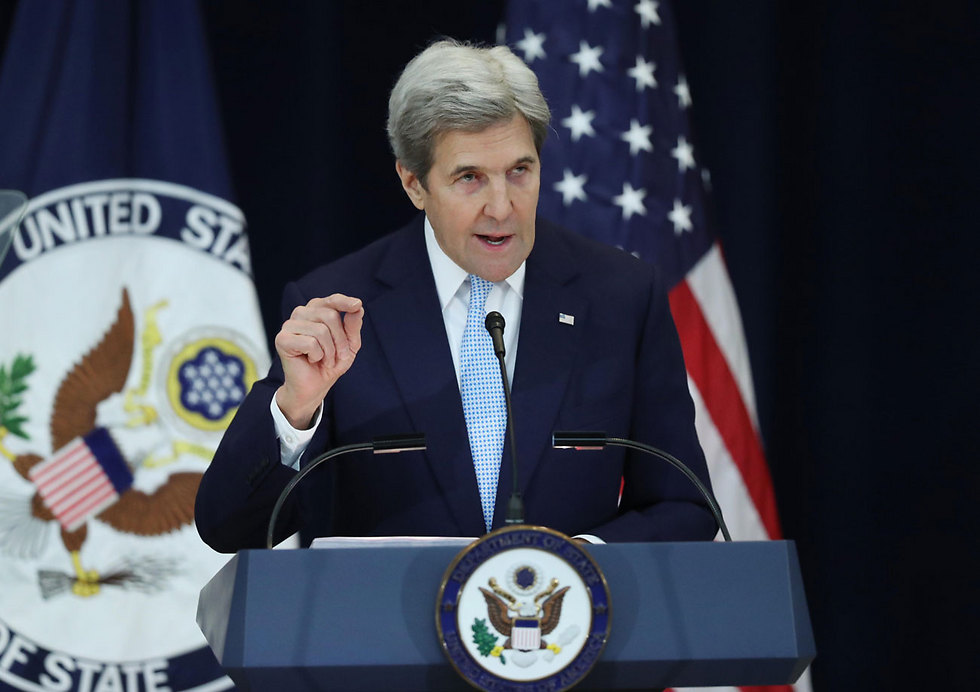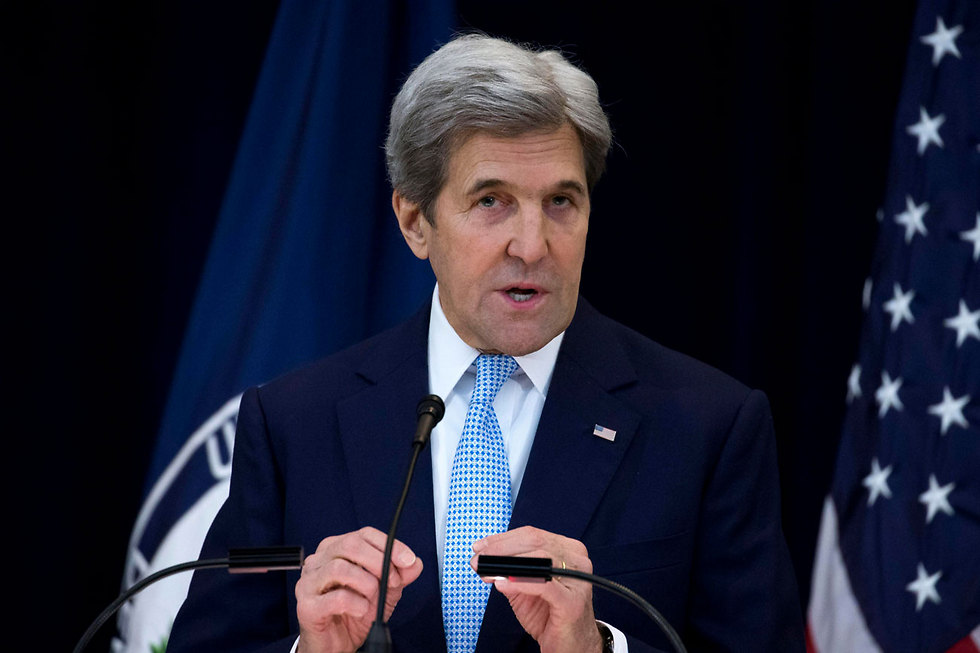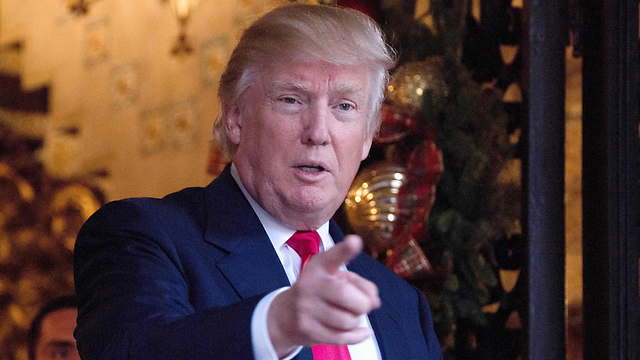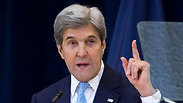
Kerry lays out parameters for peace: 'No alternative for the two-state solution'
The outgoing secretary of state calls for Jewish state alongside Arab state in 1967 borders, with some land swaps, and Jerusalem as the international capital of both nations; in farewell speech on the topic, Kerry also slams settlement construction and defends administration's decision not to veto anti-settlements resolution.
Outgoing US Secretary of State John Kerry laid out the Obama administration's parameters for peace between Israel and the Palestinians during a speech at the State Department on Wednesday that lasted 71 minutes, one of the longest in US State Department history.
Breaking sharply from longstanding US policy that foreign powers shouldn't impose a solution, Kerry unveiled a six-part outline of what a future peace deal could look like. The outline tracked closely with principles long assumed to be part of an eventual deal, and Kerry insisted he was merely describing what's emerged as points of general agreement.
Primarily, Kerry called to create a secure and recognized border between Israel and a contiguous Palestine along the 1967 lines, with "mutually agreed, equivalent (land) swaps."
"Israel will return land it has occupied since 1967. The borders must be secure and Palestine must be viable and contiguous," Kerry clarified.
Second, the secretary of state called to fulfill the UN General Assembly Resolution 181 of two states for two people: A Jewish state and an Arab state, with full and equal rights for all citizens.
Third, he stressed the need to provide a just and fair solution to the Palestinian refugees issues, including compensation, which is consistent with the idea of two states for two peoples.
Fourth, Kerry spoke of the imperative to reach an agreed resolution for Jerusalem as the international, recognized capital of the two states.
"The solution will have to meet the needs not only of the parties, but of all three monotheistic religions," Kerry said.
"Defense is the fundamental issue for Israel, fully ending the occupation is the fundamental issue for the Palestinians," he said. "Balancing both requirements is among the greatest challenges the US team has faced. But it's one the US can help with the most."
Finally, he said, the sides msut end the conflict and all outstanding claims, enabling all normal relations.
"To bring closure to this conflict, so that everyone can move ahead to a peaceful future," the secretary of state added.
Kerry offered fewer details about how the parties could get to such a deal, given the failure of so many previous attempts, including his own 9-month effort that collapsed in 2014. He urged Israelis and Palestinians to take "realistic steps on the ground now" to show seriousness of purpose and begin separating themselves into two states.
He lamented the fact the Oslo Accords never materialized and that next year the Palestinians will mark "50 years to the occupation."
"In the end, I believe the negotiations didn't fail because the gaps were too wide, but because the level of trust was too low," Kerry asserted. "Neither side is willing to even risk acknowledging the other side's bottom line."
Two-state solution in jeopardy
He shared of his own personal experiences in visiting Israel and the Palestinian Authority. "I have witnessed first-hand the ramification of a conflict that has gone on for too long," he said.
"Friends must be able to tell each other hard truths," Kerry claimed. "The truth is that trends on the ground—violence, terrorism, incitement, settlement expansion and the seemingly endless occupation—are destroying hopes for peace on both sides and increasingly cementing an irreversible one-state reality that most people do not actually want."
He invoked the widespread concern that the growing Arab population will eventually make Jews a minority in Israel, creating a democratic crisis for Israel unless there's a separate Palestinian state. "If the choice is one state, Israel can either be Jewish or democratic, it cannot be both, and it won't ever really be at peace," he said.
Prime Minister Benjamin Netanyahu, Kerry said, "supports a two-state solution. But his current coalition is among the most right-wing in Israel's history. They are leading towards a one-state situation."
He said recent trends indicate on a "comprehensive effort to take the West Bank's land for Israel. Much of Area C is effectively off-limits to Palestinian development. Most has been taken by Israel unilaterally."
"The settler agenda is defining the future of Israel and their stated purpose is clear: They believe in a one-state solution," Kerry went on to say, quoting Education Minister Naftali Bennett of the pro-settlements Bayit Yehudi who declared that "the era of the two-state solution is over."
Such an agenda, he said, will lead to "millions of Palestinians in the West Bank living in enclaves under military rule, separate and unequal. Will an Israeli accept living that way? Will an American?"
He warned that if Israel took the one-state path, "it will not have peace with the rest of the Arab world, I can guarantee that."
The bottom line, Kerry stressed, was that "without agreement and mutuality, the unilateral choices become a major point of contention."
Violence and settlements as obstacles for peace
Kerry lamented the fact that "many no longer see the other side as people, only as threats. Both sides push a narrative that works on fear," condemning Palestinian violence which he said included "hundreds of terrorist attacks in the past year."
He stressed "there is absolutely no justification for terrorism, and there never will. Yet the murderers of innocents are still glorified on Fatah websites, being photographed next to Palestinian leaders."
"President Obama and I have made it clear to Palestinian leaders countless of time that all incitement to violence must stop," he added. However, he noted, "We all understand that the Palestinian Authority has a lot more to do to strengthen its authority. Most importantly, Hamas continues to object to Israel's right to exist."
At the same time, the secretary of state also slammed Israeli settlement construction, saying Israel "has consolidated control of Palestinian land for its own purposes. I don’t think most people in Israel—and certainly in the world—have any idea how broad and systematic the process has become. But the facts speak for themselves. Settlements continue to expand. The population in these distant settlements has grown by 20,000 since 2009."
"What does that say to the Palestinians in particular, but also to the US and the world?" Kerry wondered.
While clarifying that the US did not consider the settlements "the essence of the whole conflict" and that it understands that some settlements will be included in Israel in a final-status agreement, he stressed that "if more settlers are moving into the middle of Palestinian areas, it's going to be more difficult to separate them."
"Many settlements are located in places that will make a continuous Palestinian state impossible," he explained. "It's not just a question of the overall amount of land. It's whether the land can be connected. The more the settlements expand, the less possible it'll be to create a contiguous (Palestinian) state."
He stressed that the settlements "have nothing to do with Israel's security. Many of them are problematic for the IDF."
Kerry slammed the Regulation Bill that would retroactively legalize Israeli outposts in the West Bank built with the help of the government on privately-owned Palestinian land. "Even the Israeli attorney general has said that the draft law is unconstitutional and in opposition to international law," he said.
'Obama administration was Israel's greatest friend'
Kerry's farewell speech was a comprehensive airing of grievances that have built up in the Obama administration over eight years but were rarely, until this month, discussed publicly.
Throughout his speech, Kerry insisted that the Obama administration has been Israel's greatest friend, claiming that "no American administration has done more for Israel's security than Barack Obama's."
"Time and again we have demonstrated that we have Israel's back," Kerry said. "Our assistance for Iron Dome has saved countless of lives," he added. "We have repeatedly increased funding to support Israel. This fall, we concluded talks on a historic memorandum of understanding that is more than any aid package that the US has invested in any country."
Kerry staunchly defended the Obama administration's decision to allow the UN Security Council to declare Israeli settlements illegal.
"The United States did in fact vote in accordance with our values, just as previous administrations have done," Kerry said. "The vote in the United Nations was about preserving the two-state solution. That's what we were standing up for."
"In the end, we couldn't, in good conscience, protect the most extreme elements of the settlements as they tried to destroy the two-state solution," he explained. "We may not be able to stop them, but we cannot be expected to defend them. And it is not within any country’s policy to act against its self interest."
Kerry reminded his listeners that "Any US administration—Democratic and Republican—has opposed settlements. Previous administrations have (also) allowed UN decisions against the settlements."
He also mentioned that "the only times the Obama administration has exercised its veto power was to oppose anti-Israeli resolutions," rejecting the criticism the US has abandoned Israel by not vetoing the latest resolution.
"It is not this resolution that is isolating Israel. It is the permanent policy of settlement construction that risks making peace impossible," he asserted.
He also rejected accusations that the White House was the driving force and stressed Washington "did not draft or originate" the resolution, introduce by Egypt and later by a handful of other nations. He said the Obama administration pushed for a more balanced text and eventually, while "we did not agree with every word in the resolution, we could not veto a resolution that called for an end to violence and incitement."
Though Kerry's speech was likely to further enrage Israel's government, Kerry did offer assurances that Obama wasn't planning other parting shots that Israel has been concerned are in the works. Kerry said the outgoing administration wouldn't promote a UN resolution laying out parameters for a deal, nor would it recognize Palestinian statehood.
Trump tells Israel: Stay strong!
Shortly before the speech, US President-elect Donald Trump chided the Obama administration for its stance toward Israel.
"We cannot continue to let Israel be treated with such total disdain and disrespect. They used to have a great friend in the US, but not anymore," Trump wrote on Twitter.
"The beginning of the end was the horrible Iran deal, and now this (UN)! Stay strong Israel, January 20th is fast approaching," he added, referring to when he takes over the White House from Democratic President Barack Obama.
Trump also noted that he was doing his "best" to "disregard the many inflammatory President O statements and roadblocks. Thought it was going to be a smooth transition - NOT!"
Prime Minister Benjamin Netanyahu responded to Trump's tweet later Wednesday. "President-elect Trump, thank you for your warm friendship and your clear-cut support for Israel!" wrote Netanyahu.
"We cannot continue to let Israel be treated with such total disdain and disrespect," wrote Trump earlier Wednesday, before adding, "Stay strong Israel."
Associated Press and Reuters contributed to this report.










